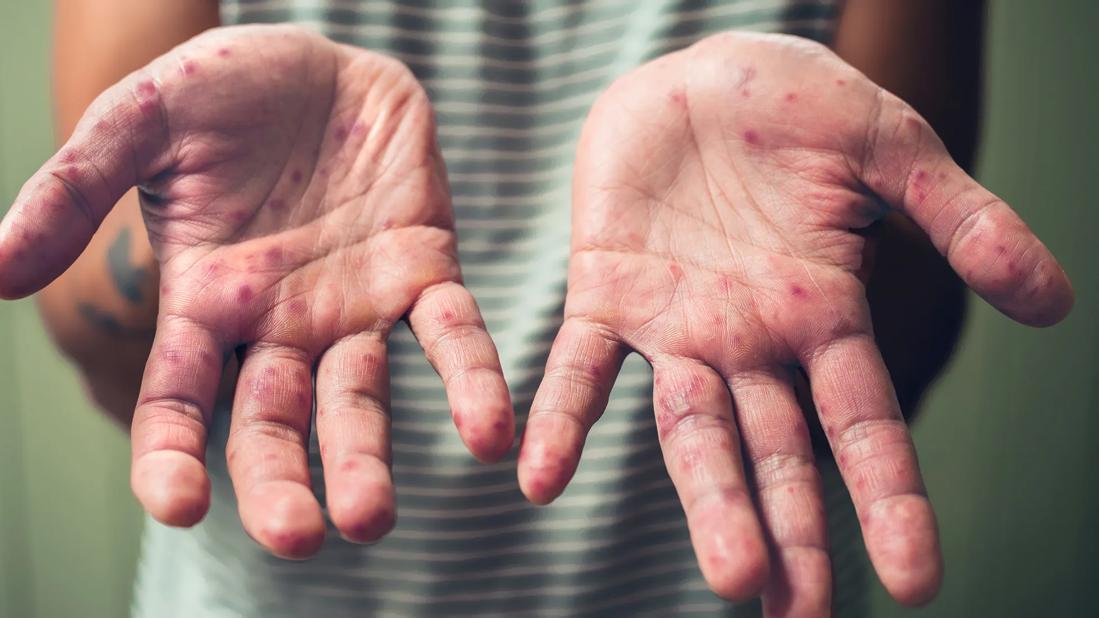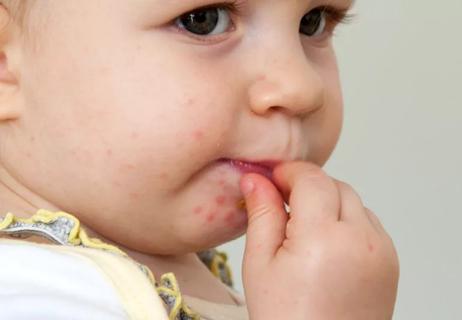Yes, but symptoms can be easy to miss

Most people associate hand, foot and mouth disease (HFMD) with little kids — the ones under 5, mostly. The ones who put everything in their mouths.
Advertisement
Cleveland Clinic is a non-profit academic medical center. Advertising on our site helps support our mission. We do not endorse non-Cleveland Clinic products or services. Policy
But adults can get it, too, especially if they’re around young children or have a weakened immune system.
“Most healthy adults tend to have milder symptoms than children, and some don’t show symptoms at all,” says family medicine physician Neha Vyas, MD. “But they can still spread it to others.”
Here’s what you need to know about what hand, foot and mouth disease means for adults.
The symptoms of HFMD are similar in kids and adults. But because symptoms may not be as obvious in adults, the illness can be easily mistaken for something else.
The disease typically begins similarly to other viral illnesses. You might feel at first like you’re coming down with a cold. Later, a telltale rash starts to appear — but not always.
“Kids usually get the pus-filled blisters (vesicles) that are a dead giveaway for HFMD, but adults don’t always get them," Dr. Vyas clarifies. “So, when adults have hand, foot and mouth disease, it often goes unrecognized.”
HFMD tends to progress in two predictable stages.
During the first stage, you’ll typically experience flu-like symptoms, like:
These early symptoms fade after a few days and are followed by blisters on your hands, feet, mouth and other places (hence the name of the disease). You may experience:
Advertisement
“It’s usually a self-limiting illness, which means it gets better on its own,” Dr. Vyas explains. “Most people recover within seven to 10 days.”
Still, your symptoms may linger longer, and lesions can last for several weeks.
There’s no specific medication to treat HFMD. Instead, the focus is on easing your symptoms until the illness runs its course.
“There’s not much a doctor can give you to make the virus go away faster,” Dr. Vyas says. “But we can help you manage symptoms and make sure there aren’t any complications.”
Try:
Good hygiene is the best way to prevent the spread of hand, foot and mouth disease. The virus spreads through saliva, mucus, poop and fluid from blisters, so handwashing is key — especially after changing diapers, wiping noses or using the bathroom.
Dr. Vyas also suggests taking the following actions:
“Hand, foot and mouth disease is very contagious, especially in households with young children,” Dr. Vyas reminds us. “If someone has it, it’s important to sanitize surfaces and practice good hygiene to avoid spreading it around.”
And even if you don’t feel any symptoms of infection, you can still pass the virus along to others.
“You can be contagious before you ever feel symptoms,” she adds. So, it’s smart to stay cautious, especially around people who are more vulnerable to infection.
HFMD usually goes away on its own. But you should call your provider if you suspect you have hand, foot and mouth disease and:
“It’s rare, but in people with weakened immune systems, HFMD can lead to complications, like viral meningitis,” Dr. Vyas warns. “So, if you’re not getting better, don’t hesitate to get checked out.” And seek care quickly if you’re pregnant, have cancer or are otherwise at risk for complications from viral illnesses.
Advertisement
Hand, foot and mouth disease isn’t just for kids. So, if it’s making its way around your house or your child’s school or daycare, know that you can catch it — and pass it to others, too.
Advertisement

Sign up for our Health Essentials emails for expert guidance on nutrition, fitness, sleep, skin care and more.
Learn more about our editorial process.
Advertisement

You can catch this highly contagious virus through contaminated food, water, droplets and more

Use a bleach solution to sanitize surfaces like doorknobs, counters, toilets and light switches

Start slowly with clear fluids, and then move to bland, easy-to-digest foods

It starts off like a cold and then progresses to a rash that can last about 10 days

Transmission typically involves skin-to-skin contact, but the virus can also linger on surfaces

Time of onset and duration of symptoms tell the story

It’s not just smoking and genetics that can increase your risk of cancer

Mpox (monkeypox) is transmitted through skin-to-skin contact, including sex

Even small moments of time outdoors can help reduce stress, boost mood and restore a sense of calm

A correct prescription helps your eyes see clearly — but as natural changes occur, you may need stronger or different eyeglasses

Both are medical emergencies, but they are very distinct events with different causes